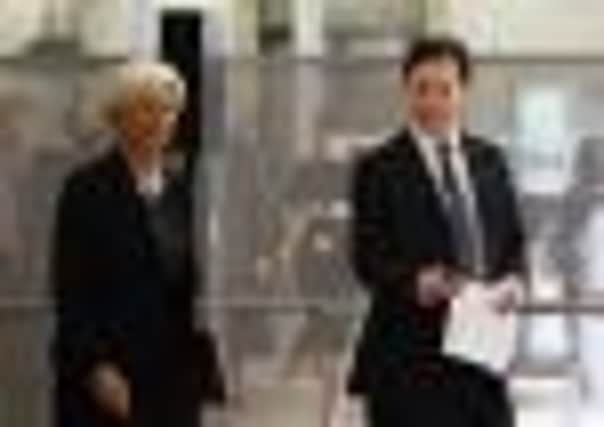IMF tells George Osborne economy needs a Plan B


IMF managing director Christine Lagarde said the UK economy had underperformed, unemployment remained “much too high” and that situation would become “entrenched” unless ministers sought to inject life into the economy soon.
In its annual review of the UK, the IMF urged that a further round of quantitative easing (QE) – or printing money – and a fresh cut in the 0.5 per cent rate of interest should be considered immediately.
Advertisement
Hide AdAdvertisement
Hide AdMs Lagarde also said ministers should be preparing a further plan for a worse ecomomic environment, such as a eurozone fallout that could include a cut in VAT or payroll taxes, including National Insurance, plus a fresh injection of money on capital projects across the country.
Her warnings were seized upon by shadow chancellor Ed Balls, who said the IMF’s report amounted to an endorsement of Labour calls for a “Plan B” to boost jobs and growth, a reaction that was echoed by the SNP’s Treasury spokesman Stewart Hosie.
However, the IMF report also said Mr Osborne should not divert his course on deficit reduction, saying any measures would have to come from more cuts to public-sector wages or a marked hike in property taxes.
Ms Lagarde gave Mr Osborne support for his efforts to cut public spending, saying they had given the country some “hard- won credibility” on the international money markets.
Reflecting on the situation facing the coalition in May 2010, when the UK’s deficit hit 11 per cent of GDP, she said: “Sometimes you feel like you could look back and wonder ‘what if?’… I try to imagine what the situation would be like today if no such fiscal consolidation programme had been decided … I shiver.”
The fragility of the UK government’s position was underlined as another report from the Organisation for Economic Co-operation and Development (OECD) warned the 17-member eurozone now risked falling into a “severe recession”, dragging the UK economy down with it.
It too said UK ministers were right to stick by their own plans to tighten fiscal policy, but repeated warnings that the recovery would be slow and timid, with growth for the whole of 2012 in the UK likely to be just 0.5 per cent, well below the rate of inflation.
And new figures from the Office for National Statistics (ONS) published yesterday showed the UK inflation is now 3 per cent, compared with 3.5 per cent in March, its lowest level since February 2010.
Advertisement
Hide AdAdvertisement
Hide AdMr Osborne said the IMF report showed his focus on deficit-cutting was the right one, but he confirmed that the government was considering an emergency plan if the eurozone situation worsened. He said: “It is clear that we are now reaching a critical point for the eurozone. Eurozone countries need to stand behind their currency or face up to the prospect of Greek exit, with all the risks that that could involve.
“The British government is doing contingency planning for all potential outcomes. It is our responsibility to ensure that while we work for the best, we prepare for something worse.”
That prompted r Mr Balls to ask “how bad do things have to get” before the coalition changed course.
“The IMF is right to call for action to boost the British economy and to stop slow growth and high unemployment causing long-term damage to our economy,” he said.
“How much worse do things have to get before David Cameron and George Osborne finally take action?”
He added: “We have to get the deficit down but, as Christine Lagarde has warned, the right pace is essential and growth is necessary for fiscal credibility.”
Stewart Hosie, the SNP’s Treasury spokesman, said: “The UK government must listen to the IMF and deliver the Plan B that the Scottish Government has been arguing for to boost growth and employment. It seems that everyone except the Chancellor recognises the importance of infrastructure spend as a means to promote economic growth.”
The two reports come as the European economy is back on emergency watch. amid fresh uncertainty from the eurozone, following an inconclusive summit of G8 leaders at the weekend, and with fresh elections in Greece next month.
Advertisement
Hide AdAdvertisement
Hide AdPrime Minister David Cameron has made it clear that if Greece votes in anti-austerity parties in that election, it will be tantamount to a vote against eurozone membership, prompting their withdrawal from the single currency.
Without a sufficient “firewall” to protect weak banks across the eurozone, there are fears a Greek exit could cause a run on several other countries, forcing them to quit the single currency as well.
The IMF said instability in the eurozone was the “key risk” to the UK’s economy.
The OECD report said the UK government had no room to ease up on austerity to boost growth.
“Fiscal consolidation is a drag on growth,” it said. “However…fiscal policy remains heavily constrained.”
It said conditions should improve for the UK from the second half of the year, with inflation falling to 2.6 per cent in 2012 and 1.9 per cent in 2013.
There were warnings last night that any further extension in QE would hit pension fund holders. Joanne Segars, chief executive of the National Association of Pension Funds, said: “QE has driven pension funds further into the red and leaves those trying to buy an annuity with a worse deal, which they are then locked into for life.”